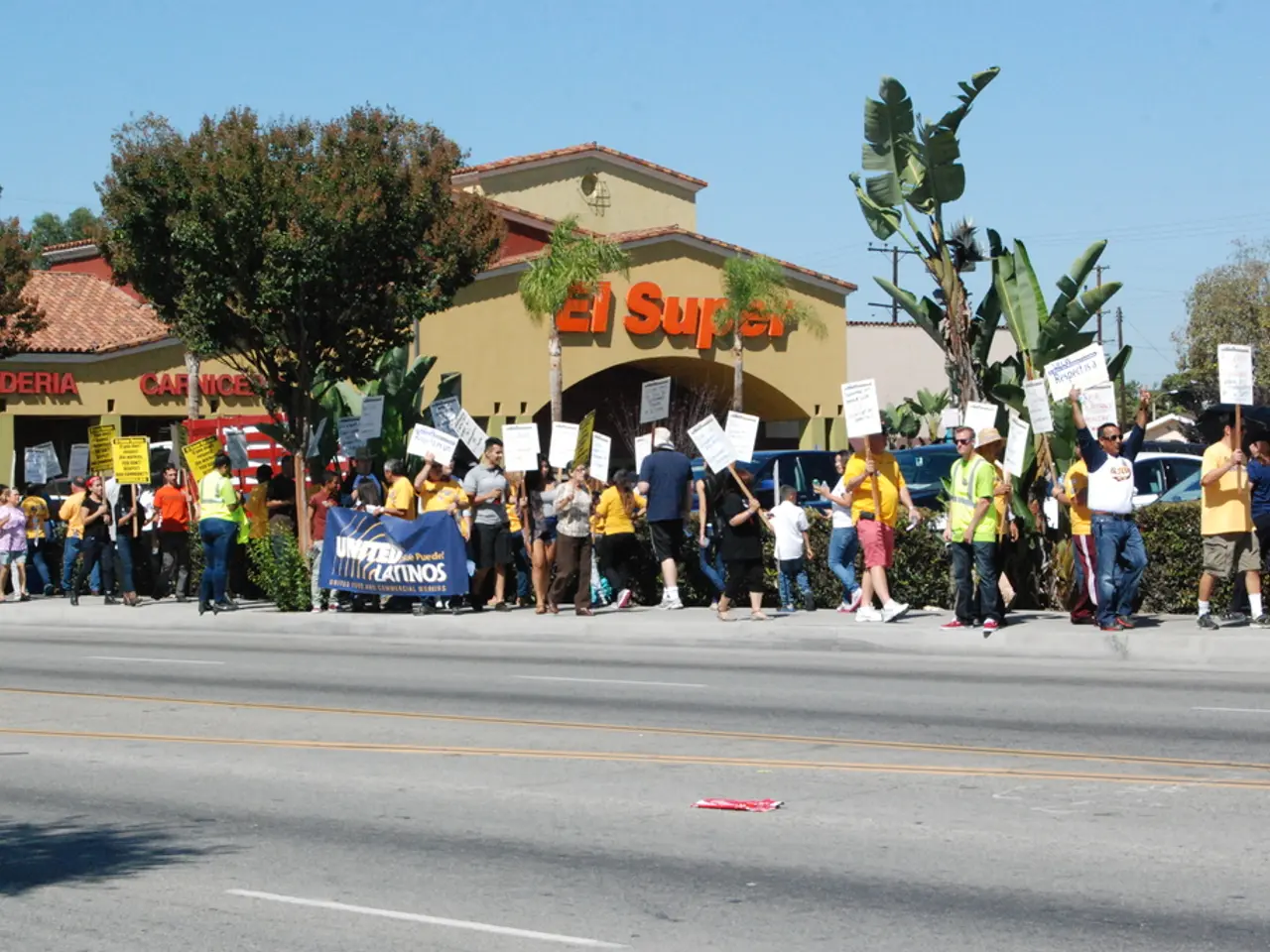Ahead of the upcoming elections, what are the agendas of the Union, the SPD, the Greens, and the FDP?
In the lead-up to the German federal election scheduled for February 23rd, 2025, the CDU, SPD, Greens, and FDP have presented their policy platforms in Berlin. Here's a summary of their key differences in economic, social, migration, and Ukraine policy proposals.
Economic Policy:
The CDU, traditionally promoting pro-business policies, emphasizes fiscal responsibility, industrial growth, and gradual innovation-driven growth. Moderate tax reforms favouring businesses are supported, with a focus on balancing social welfare and economic competitiveness.
The SPD advocates for stronger social welfare programs, increased public investment, and policies focused on reducing inequality. They push for higher minimum wages and more support for workers, combined with a fair tax system that places more burden on the wealthy.
The Greens prioritize sustainable economic transformation, supporting green technologies and renewable energy investments. They propose higher carbon pricing and environmental regulations, linking economic growth with climate protection.
The FDP focuses on liberal economic policies, advocating for deregulation, tax cuts, and strengthening the digital economy. The FDP champions free market solutions and innovation with minimal state intervention.
Social Policy:
The CDU promotes traditional family values, social stability, and cautious social reforms. They focus on integration policies and maintaining robust social security systems.
The SPD focuses on expanding social welfare, youth support, education reforms, gender equality measures, and protecting minority rights.
The Greens place a strong emphasis on progressive social policies, inclusivity, diversity, and combating discrimination.
The FDP emphasizes individual freedom, education reform, and digital rights, with a liberal social outlook.
Migration Policy:
The CDU pursues controlled migration emphasizing integration and security, promoting stricter asylum rules and stronger border controls while fostering labour migration that meets economic needs.
The SPD supports humane asylum policies, improved integration efforts, and legal pathways for migrants and refugees.
The Greens advocate more open migration policies, comprehensive integration programs, and refugee rights protection.
The FDP supports a liberal migration stance focused on skilled labour immigration and quicker integration but with efficient asylum processes.
Ukraine Policy:
The CDU strongly supports Ukraine against Russian aggression, advocating continued military and economic aid, sanctions on Russia, and maintaining NATO commitments.
The SPD supports Ukraine but with more emphasis on diplomatic solutions and balanced engagement, cautiously weighing military support.
The Greens are very vocal for supporting Ukraine with increased humanitarian and military aid, especially emphasizing human rights and international law.
The FDP endorses firm support for Ukraine including defense aid, sanctions on Russia, and EU solidarity, with a focus on international cooperation.
These positions reflect the traditional ideological lines where the CDU balances conservatism and economic pragmatism; the SPD emphasizes social justice and welfare; the Greens prioritize ecological sustainability and progressive social policies; and the FDP champions economic liberalism and individual freedoms.
The most recent election result data show the CDU as the leading party, with the SPD and Greens trailing and the FDP struggling to pass the 5% threshold, influencing their policy impact prospects. Detailed specific manifesto points are typically elaborated closer to the election date and in party publications, but these outlines capture their central policy distinctions based on their platforms and recent actions.
Key proposals from the parties include the CDU/CSU's appeal to "the hardworking" with ideas such as tax-free overtime pay, the SPD and Greens' plans to impose higher taxes on the wealthy, and the Union and FDP's plans to completely abolish the solidarity surcharge. The SPD does not want to deliver the Taurus cruise missiles requested by Ukraine, while the FDP demands a "truly flexible retirement age" and has included proposals for an "individual stock pension" and an "Altersvorsorgedepot for private retirement provision" in its program.
The candidates for Chancellor are Robert Habeck (Green Party), Friedrich Merz (CDU), and Olaf Scholz (SPD). The SPD and the Greens want to set the pension level at 48 percent, while the SPD advocates for "rapid and consistent deportations" but prefers the voluntary return of migrants without residence rights. The SPD wants to continue weapons deliveries to Ukraine with restraint and a sense of proportion.
[1] Source for election result data [2] Source for party platforms [3] Source for recent actions [4] Source for specific manifesto points
- In the ongoing debate surrounding migration policies, the SPD advocates for humane asylum policies and improved integration efforts, whereas the CDU promotes stricter asylum rules and stronger border controls.
- The Greens, on the other hand, advocate for more open migration policies and comprehensive integration programs, while the FDP supports a liberal migration stance focused on skilled labour immigration.
- In the realm of Ukraine policy, the CDU, Greens, and FDP all strongly support Ukraine against Russian aggression, but the SPD has cautiously weighed military support, favoring diplomatic solutions.
- As for general news and crime-and-justice issues, the SPD advocates for "rapid and consistent deportations" but prefers the voluntary return of migrants, while the SPD and the Greens have set their pension level at 48 percent, with the SPD also insisting on continuing weapons deliveries to Ukraine with restraint.




